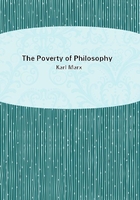
第33章 (6)
Just the as antithesis was before turned into an antidote, so now the thesis becomes a hypothesis. This change of terms, coming from M. Proudhon, has no longer anything surprising for us! Human reason, which is anything but pure, having only incomplete vision, encounters at every step new problems to be solved. Every new thesis which it discovers in absolute reason and which is the negation of the first thesis, becomes for it a synthesis, which it accepts rather naively as the solution of the problem in question.
It is thus that this reason frets and fumes in ever renewing contradictions until, coming to the end of the contradictions, it perceives that all its theses and syntheses are merely contradictory hypotheses. In its perplexity, "human reason, social genius, returns in one leap to all its former positions, and in a single formula, solves all its problems". This unique formula, by the way, constitutes M. Proudhon's true discovery. It is constituted value.
Hypotheses are made only in view of a certain aiM. The aim that social genius, speaking through the mouth of M. Proudhon, set itself in the first place, was to eliminate the bad in every economic category, in order to have nothing left but the good. For it, the good, the supreme well-being, the real practical aim, is equality. And why did the social genius aim at equality rather than inequality, fraternity, catholicism, or any other principle? Because "humanity has successively realized so many separate hypotheses only in view of a superior hypothesis", which precisely is equality. In other words: because equality is M. Proudhon's ideal. He imagines that the division of labor, credit, the workshop --all economic relations -- were invented merely for the benefit of equality, and yet they always ended up by turning against it. Since history and the fiction of M. Proudhon contradict each other at every step, the latter concludes that there is a contradiction. If there is a contradiction, it exists only between his fixed idea and real movement.
Henceforth, the good side of an economic relation is that which affirms equality; the bad side, that which negates it and affirms inequality.
Every new category is a hypothesis of the social genius to eliminate the inequality engendered by the preceding hypothesis. In short, equality is th e primordial intention, the mystical tendency, the providential aim that the social genius has constantly before its eyes as it whirls in the circle of economic contradictions. Thus, Providence is the locomotive which makes the whole of M. Proudhon's economic baggage move better than his pure and volatized reason. He has devoted to Providence a whole chapter, which follows the one on taxes.
Providence, providential aim, this is the great word used today to explain the movement of history. In fact, this word explains nothing.
It is at most a rhetorical form, one of the various ways of paraphrasing facts.
It is a fact that in Scotland landed property acquired a new value by the development of English industry. This industry opened up new outlets for wool. In order to produce wool on a large scale, arable land had to be transformed into pasturage. To effect this transformation, the estates had to be concentrated. To concentrate the estates, small holdings had first to be abolished, thousands of tenants had to be driven from their native soil and a few shepherds in charge of millions of sheep to be installed in their place. Thus, by successive transformations, landed property in Scotland has resulted in the driving out of men by sheep. Now say that the providential aim of the institution of landed property in Scotland was to have men driven out by sheep, and you will have made providential history.
Of course, the tendency towards equality belongs to our century.
To say now that all former centuries, with entirely different needs, means of production, etc., worked providentially for the realization of equality is, firstly, to substitute the means and the men of our century for the men and the means of earlier centuries and to misunderstand the historical movement by which the successive generations transformed the results acquired by the generations that preceded theM. Economists know very well that the very thing that was for the one a finished product was for the other but the raw material for new production.
Suppose, as M. Proudhon does, that social genius produced, or rather improvised, the feudal lords with the providential aim of transforming the settlers into responsible and equally-placed workers: and you will have effected a substitution of aims and of persons worthy of the Providence that instituted landed property in Scotland, in order to give itself the malicious pleasure of driving out men by sheep.
But since M. Proudhon takes such a tender interest in Providence, we refer him to the Histoire de l'economie politique of M. de Villeneuve-Bargemont, who likewise goes in pursuit of a providential aiM. This aim, however, is not equality, but catholicism.
Seventh and Last Observation Economists have a singular method of procedure. There are only two kinds of institutions for them, artificial and natural. The institutions of feudalism are artificial institutions, those of the bourgeoisie are natural institutions.